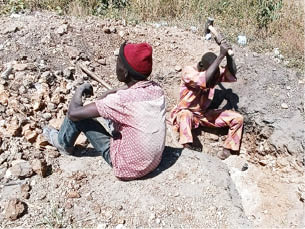Since precious stones were discovered in commercial quantity at some sites in Takushara land by local miners in June this year, life has not remained the same for residents as mining activities have led to unrest in the community. Daily Trust Saturday reports that residents of the now mining community, located after the Apo Mechanic Village in the Abuja Municipal Area Council (AMAC) of the Federal Capital Territory (FCT), fight for business opportunities, which reportedly lead to injuries and sometimes, alleged deaths.
The area is now a beehive of activities as young men, women, school children and the aged deploy their energies in excavating the stones. Some of the precious stones found in the community include Sodalite, Aventurine and Lithium. Many have since shifted base from neighbouring communities and settled down in the community because of its remoteness from their localities, coupled with the inaccessible nature of the road leading to the sites.
Over 7,000 people are said to be currently settled in this mining village, while more have continued to troop in, both for mining and other trading activities.
- Bandits kill 3, destroy properties in Gombe communities
- HYPPADEC pledges more interventions in communities
Daily Trust Saturday gathered that most of the miners are from Plateau and Benue states, where mining is the order of the day in most communities.
Our correspondent who went round different sites disguised as a customer observed that mining operations were going on smoothly. An established Chinese company was also seen doing business in the community.
Residents said since the mining and excavation in the community began, issues of theft had reduced drastically as alleged perpetrators now engage in the business.
“Most of the criminals in this community have all gone into the business. If you go to the sites now you will find them breaking stones. At night, they will be asleep due to tiredness. So, the discovery of the sites here have reduced theft, not only in this community as neighbouring communities are saying the same thing,” a resident, Chiamaka Ikechuku said.
A labourer who gave his name as Sani Bello said he moved into the community from Kabusa, a suburb of the Federal Capital Territory (FCT).
He said three persons reportedly died while several others had been injured as a result of the ongoing activities in the community.
“Since I moved into this community in July, three persons have died while a lot of people have been injured. They get injured through the use of big hammers to break the stones. Those that died dug for precious stones deep down the soil, and while they were under, the stones fell on them and killed them,” he said.
He said the stones vary, adding that the prices per bag range from N700 to N3,500
“A new site was recently discovered. The precious stones there are special. They are sold at N3,500 per bag. As you can see, bulldozers are still drilling the place. We can’t go close because of the vigilante guarding the place.
“Most of the miners came from Plateau and Benue states because they seem to have more experience in breaking precious stones.” he said, pointing in their direction
One of the miners, Ruth Benson, while noting that sales have reduced drastically, said she had been on the site since Tuesday without even selling a bag.
“Abeg come buy my market make I fit chop; I de hungry. I never sell even one bag since Tuesday,” she told our correspondent in Pidgin English.
A lady who runs a chemist shop in the community was seen treating a man who got his finger injured while breaking the stones.
The nurse, who gave her name as Rukayat, in a chat with our reporter, said she treated at least five persons daily.
“I don’t stay in this community. I live in Kabusa. I secured a shop here in August. I spend N600 daily on transportation but I don’t feel it because there is business. I treat no fewer than five people on a daily basis. I have already dressed four wounds today,” she said.
A public affairs analyst, Gbenja Babatunde, told our reporter that Nigeria could earn over $12billion from gemstones annually if it invests in a laboratory to certify the value of the commodities.
Babatunde said that despite enormous solid mineral deposits with potentials to ‘fire up the economy,’ the country’s mining sector’s contribution to the gross domestic product has remained low for more than 40 years.
“Unfortunately, in Nigeria, despite the country’s resource potential and its past experience as a significant mineral producer of tin, columbite and coal, the sector today has one of the lowest outputs.
“Even during the commodity super cycle, the country was unable to attract significant investment in exploration and mining into the sector. Moreover, productivity from the Nigerian mining sector is still insufficient to meet local demands for key inputs from mining,” he said.
Daily Trust Saturday reports that the mining is illegally done and miners are daring the risk, believing that the gemstones would take them out of poverty.
According to Wikipedia, precious stones, also called gemstones, are pieces of mineral crystal, which when cut and polished, are used to make jewellery and other adornments. However, certain rocks, such as lapis lazuli, opal and obsidian, and occasionally, organic materials that are not minerals, such as amber, jet and pearl, are also used for jewellery, and are, therefore, often considered to be precious stones as well.
Most precious stones are hard, but some soft minerals are used in jewellery because of their luster or other physical properties that have aesthetic value.
The Nigerian Extractive Industries and Transparency Initiative (NEITI) audit findings in 2017 showed that solid mineral deposits are spread all over Nigeria, with more deposits in certain areas than others.
Over 40 million tonnes of talc deposits have been identified in Niger, Osun, Kogi, Ogun and Kaduna states. The commercial value of Nigeria’s solid minerals is estimated to run into trillions of dollars, with 70 per cent of these believed to be buried in the bowels of northern Nigeria.




